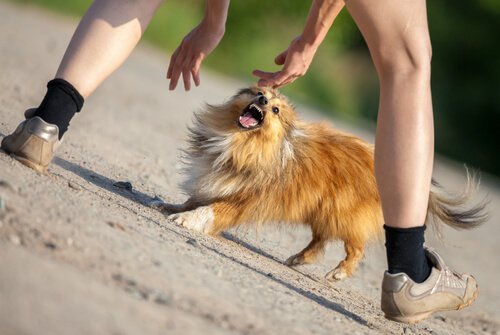Dog Bite Prevention
It is not always possible, but there are steps you can take to make yourself safer and to minimize the likelihood that you will be a victim. The American Veterinary Medical Association sponsors Dog Bite Prevention Week in May, and offers several tips to help keep you and your loved ones safe from animal bites.
Be a Responsible Sacramento Dog Owner
If you are like the millions of Americans who own dogs, you cannot imagine your pet biting someone. However, almost every dog that bites is someone’s pet. Any dog can bite under the right circumstances, so it is extremely important that you minimize the chances of your dog biting by taking the proper precautions to prevent this problem. Preventing dog bites begins with owner responsibility. Train your dog from the first day you bring it home and engage the services of professional trainers to help you ensure that dangerous behavior is minimized. If you notice any erratic or aggressive behavior on your dog’s part, take it to the vet immediately to see if illness might be the issue. Many dogs bite because they are hurt or sick. Finally, never play aggressively with your dog, and give it proper socialization with people and other dogs early to minimize fearful aggression.
Educate Your Children
At least 60 percent of dog bite victims are children, and approximately 70% of dog bite wounds are inflicted on a child’s face. Children naturally migrate toward dogs and want to pet them, but this can have tragic consequences. Teach your children to never approach a dog in a sudden manner; dogs can interpret this as aggression, especially if the children are laughing and shouting. Children should be taught to ask owners for permission before petting dogs; owners who prepare their dogs by asking them to sit and give them “permission” to sniff a child are far less likely to snap or bite than dogs that are thrust into an unwelcome contact with a child. Adults should also never leave a dog alone with a child, particularly if the dog has limited experience with that child.
Protection from Dog Bites
How can you protect yourself and your family from dog bites, and what should you do if you are bitten by a dog? Experts such as those at the Centers for Disease Control offer some tips to prevent dog bites, including:
- Choose your own dog breed carefully. Consult an expert such as a vet or breeder to determine if the breed you are considering is a good fit for you and your family.
- Never bring a dog with a history of aggression into a home with children or the elderly.
- If your child seems afraid of a dog, do not force interaction. Allow children to become comfortable around dogs at their own pace.
- Spend time with a dog before allowing your children to interact with it.
- Spay or neuter your own dog. This not only has the benefit of reducing aggression, it also has the effect of preventing unwanted puppies that may end up in a shelter.
- Do not play aggressively with a dog by wrestling or trying to take an object a dog is holding in its mouth.
- Socialize your own animals with people and other dogs in controlled situations. If your dog develops any aggressive tendencies such as growling or snapping, seek professional training help immediately.
- Never approach a strange dog, especially suddenly or without warning, and never allow your children to do so. Teach children to ask permission from an owner before attempting to pet a dog.
- If a dog is displaying obvious aggression such as growling, making direct eye contact or lowering its body toward the ground, move away swiftly but without running. Breaking eye contact may stop an attack.
- If you are concerned about an aggressive dog or see a dog wandering off-leash, contact animal control authorities immediately.
How Can I Protect Myself and My Children From Dog Bites?
Dog Bite Prevention For small children, supervision is one of the key elements to preventing dog bites, according to experienced Sacramento dog bite lawyers. They suggest following these simple steps:
- Never leave a child aged two or under unsupervised around any dog, not even family pets. Small children cannot possibly understand that some of their actions might provoke a normally placid animal into lashing out, and a single bite can do incredibly horrific damage to tender skin and undeveloped muscle tissue in a toddler.
- Children should be taught never to approach a strange dog, even one that is in a car or seemingly secured by a chain. A nervous dog can easily lash out at an unknown child—or any other person—that comes too close when the dog’s owner is not around.
- Any dog that is eating a meal, chewing on a bone or playing with a toy should never be approached by a child. Parents should instill this lesson as early as a child is able to understand the message.
- If a parent sees a child pulling a dog’s ears or tail (common precursors to dog bites), or slapping or kicking any dog, they should explain to the child that this behavior is never acceptable.
Preventing an Attack
If a dog is startled, frightened, bored, annoyed, or trained to be aggressive by an ignorant owner, they can and do bite, and the results can be devastating.
It is equally true that people can take steps to prevent dog attacks, or limit the damage done if a dog does decide to lash out. Sacramento dog bite attorneys say every parent should educate their children on how to deal with any dog, whether a family pet or a stray off its leash. These simple tips include:
- Don’t smile at a strange dog. The animal doesn’t necessarily see a friendly face; instead they see someone baring their teeth, an invitation to a fight in the dog world.
Never taunt a dog, even if you believe they are out of reach. If they free themselves, some dogs have exceptionally good memories and will lash out at people who have deliberately annoyed them. - Stay away from dogs that are chained or tethered. Bored dogs that have been restricted for extended periods of time are more likely to attack.
- Watch for warning signs. If a dog approaches you with its head held high or low, he is probably just looking to play or is curious. If the head is level and steady, the dog may have more sinister intentions.
- A dog who gallops toward you is just trying to play. A more even run means the dog is coming to protect his territory or intends to drive you away.
Protect Yourself
If the worst happens and a dog does launch an attack against you, there are still things you can do to prevent or limit the damage done. Some of the things you can do include:
- Block the attack. If a dog is showing his teeth, use your leg or a stick or anything else of a similar size to stop the dog’s teeth from reaching you.
- Stay calm. Dogs can actually sense fear, and if you panic, the dog will either feel more confident or see your shouts, screams or sudden movements as a sign of aggression.
- Never, ever run away. This can activate a dog’s basic instinct to chase and catch prey.
- Don’t make eye contact. Dogs see this as an act of aggression. Stand sideways and fold your arms, keeping your hands tucked away. This will show the dog you’re not a threat and also protect your hands if the dog does bite.
- Stand still and hold your position. Dogs have short attention spans and after checking you out, if nothing is happening, they are likely to just bark a couple of times and then go away.
- Protect your vulnerable areas. If you have time, take off a shirt or jacket and if the dog attacks, allow him to get hold of a sleeve. If you’re lucky enough to have an umbrella with you, open it and keep it between you and the dog. The dog will consider the umbrella part of your body and will go for it first, giving you time to get away or preventing the dog from getting hold of actual flesh.
Be Aware of Dogs in Your Surroundings
The vast majority of dogs are no danger to people or other animals. However, if you notice a dog in your neighborhood that barks incessantly or is overtly aggressive, be aware. Stay away from such animals and teach your children to do so as well.
If, in spite of your precautions, you or a loved one suffers a dog attack, a dog bite lawyer can help you understand your rights and can help you determine the best way to collect damages for your injuries.
- Seek immediate medical treatment. Never ignore a dog bite even if it was “minor.” Even if you think your injury is not that serious, dog bites can transmit diseases, and often require immediate medical attention to treat the wound area and flush out harmful germs. For more serious injuries, failing to receive prompt medical attention will most likely hurt your case, since insurance companies may refuse to believe that your injury was serious.
- Once you have treated your physical state, addressing your mental health is also important. It is not uncommon for the mental trauma of a dog bite to be worse than the physical injury. Many people, especially children, suffer from nightmares, panic attacks, and other symptoms of extreme stress for many months after a dog bite attack. Psychological counseling and treatment may be necessary to regain your former quality of life or to control panic attacks and other physical manifestations of your fear.
- Notify the authorities. If you have been bitten, notifying the police or local animal control agency is essential. An investigation by these agencies may prove crucial to building up your case against the dog owner.
- Take pictures and document everything. This is extremely important, since the value of a dog bite injury is heavily dependent on the appearance of the initial injury, along with the appearance of subsequent disfigurement or scarring that may develop over time. Also, taking notes about the incident while it is still fresh in your mind is advisable, since your potential claim may take a long time to resolve. In addition, it is advisable that you keep a file to store photographs, medical records, insurance company correspondence, and any other documents related to the incident.
- Do not give recorded statements or sign insurance company forms. Keep in mind that any statements or forms requested by the dog owner’s insurance company are meant to protect the carrier’s interests. Any omissions or mistakes on your part will definitely be used against you if you file a lawsuit.
- Hire an experienced Sacramento dog bite attorney. If your injuries are serious, it is in your best interest to hire a lawyer to help you resolve the claim. Between medical bills, pain and suffering, and increased living expenses, you may be eligible to recover damages that only an experienced lawyer who handles dog bite cases can help you with. A professional personal injury attorney can usually obtain much more compensation than an unrepresented dog bite victim can collect on his/her own.
Most dogs are good dogs, and experts say there are very few animals that are actually born vicious. However, when they are trained to be aggressive, or if they become bored, irritated or anxious, it’s vitally important for people to realize that any dog could potentially bite.
Older dogs who have never, ever shown aggressive tendencies can develop arthritis in the joints. If a child accidentally touches a very sore part of the dog’s body, even though they think they are just petting the dog, the consequences can be horrible and even life-changing. A dog that has never so much as growled at someone can suddenly and violently lash out if they’re in pain.
Parents can help to prevent these painful and traumatic injuries by following the safety tips outlined above, but without any doubt, dog bites will still occur, and hundreds of thousands of Americans each year will have to go to an emergency room for treatment.
What To Do If The Dog Does Bite
Handling a Dog Bite Attack If after all your efforts you still get bitten, Sacramento dog bite lawyers say it’s important that you treat any wounds immediately and properly, to prevent infection from setting in. Get to a doctor or other medical provider as soon as possible. In the meantime, follow these steps:
- Apply gentle pressure if you’re bleeding. Use a sterile gauze pad if possible to prevent infection.
- Wash the wound thoroughly, with warm water.
- Dress the wound with a sterile bandage (for larger wounds), or a sterile band-aid for small cuts.
- If you haven’t had a tetanus injection in the past five years, let your doctor know.
- Change the wound dressing at least once or twice per day.
- Watch for signs of infection, including redness, hot spots, unexpected tenderness or if the wound oozes. In these cases, get to a medical provider as soon as possible.
What Should I Do If I Am Bitten By A Dog in Sacramento?
If you or a member of your family has been bitten and injured by someone else’s dog, then the owner of that dog is liable, and you should contact a compassionate and experienced Sacramento dog bite attorney. They will explain all your options and help you get the compensation you deserve. A consultation is free, and if you decide to proceed with your claim, the personal injury attorney will guide you through the entire process.
Demas Law Group, P.C., has been providing the highest quality of legal services to Californians for nearly twenty years. We take great pride in meeting our clients’ needs while working together to win your case and obtain the maximum compensation allowed by law. We are here to help you during this difficult time. Call our team of Sacramento injury lawyers at (888) 776-0977.
This literature may be considered attorney advertising or an offer of professional services, according to rule 1-400 Rules of Professional Conduct by the State Bar of California. The information does not constitute a guarantee, warranty or prediction regarding the outcome of your potential legal matter.








